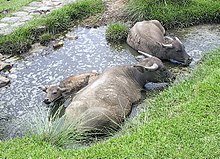Radical 93
| 牛 牜 ⺧ | ||
|---|---|---|
| 92 ⽛ ◄ | 93 | ► ⽝ 94 |
| Pinyin : | niú 牛 字 旁 niúzìpáng (= radical beef) |
|
| Zhuyin : | ㄋ 一 ㄡ | |
| Hiragana : | う し ushi | |
| Kanji : |
牛 偏 ushihen (= radical beef) |
|
| Hangul : | 소 | |
| Sinocorean : | 우 u (= beef) | |
| Codepoint : | U + 725B 725C |
|
| Stroke sequence : |
|
|
Radical 93 with the meaning “ cattle ”, also buffalo, ox or bull, is one of 34 of the 214 traditional radicals in Chinese writing that are written with four lines.
With 34 character combinations in Mathews' Chinese-English Dictionary, there are relatively many characters that can be found under this radical in the lexicon.
The radical beef takes only in the traditional characters - list of traditional radicals consisting of 214 radicals, the 93rd position. It can be found in a completely different place in modern abbreviation dictionaries. In the New Chinese-German Dictionary from the People's Republic of China, for example, it is 110th.
The seal mark shows two large, U-shaped horns bent upwards, one of which can still be seen as a vertical 撇 line to the left of 牛 (niu). In the narrowly pressed spelling variant das, the radical is always found on the left in compound characters.
Under no circumstances should the radical 93 牛be confused with the very similar-looking symbol 午 for the horse, formed from radical 24 , whose earth branch symbol is in turn the radical 187馬 with the short form 马.
A variant assumes 牛 in the head position in the compound sign, for example in: 告 (gao = to communicate). Its original meaning was to pray to the gods while a sacrifice - often an ox - was being made. Hence the beef here too auch.
The signs governed by 牛 mostly have to do with the topic of cattle or what was thought to be cattle-like, such as 特 (te in 特 牛 teniu), 犀 (= rhinoceros) and 牺 (= sacrificial animal).
牟 (onomatopoeic for moo!), 牢 (lao = enclosure) also belong to cattle. It becomes correct with 牧 (mu = herding cattle). Here we see the beef 牛 (niu) on the left and the hand with the stick (攵) on the right.

The buffalo牛niú (or beef, bull, ox) is considered good-natured according to the Chinese calendar . Buffalo years (丑chǒu ) are:
| 19th of February | 1901 to February 7th | 1902 - metal |
| February 6th | 1913 to January 25th | 1914 - water |
| January 25th | 1925 to February 12 | 1926 - wood |
| February 11th | 1937 to January 30th | 1938 - fire |
| January 29th | 1949 to February 16 | 1950 - earth |
| February 15th | 1961 to February 4th | 1962 - metal |
| 3 February | 1973 to January 22nd | 1974 - water |
| 20. February | 1985 to February 8th | 1986 - wood |
| February 7th | 1997 to January 27th | 1998 - fire |
| January 26th | 2009 to February 23 | 2010 - earth |
| February 12th | 2021 to January 31 | 2022 - metal |
People born in the Ox years are considered powerful, loyal and reliable. They are capable leaders who scrutinize before embarking on something new - but if they do, then with all their hearts. Work and family are important values.
Character compounds ruled by radical 93
| Strokes | character |
|---|---|
| + 0 | 牛 牜
|
| + 2 | 牝 牞 牟 先
|
| + 3 | 牠 牡 牢 牣 牤 告
|
| + 4 | 牥 牦 牧 牨 物 牪 牫 牬
|
| + 5 | 牭 牮 牯 牰 牱 牲 牳 牴 牵
|
| + 6 | 牶 牷 牸 特 牺
|
| + 7 | 牻 牼 牽 牾 牿 犁
|
| + 8 | 犀 犂 犃 犄 犅 犆 犇 犈 犉 犊 犋
|
| + 9 | 犌 犍 犎 犏 犐 犑
|
| +10 | 犒 犓 犔 犕 犖 犗
|
| +11 | 犘 犙 犚 犛
|
| +12 | 犜 犝 犞 犟
|
| +13 | 犠
|
| +15 | 犡 犢 犣 犤 犥 犦
|
| +16 | 犧 犨
|
| +18 | 犩
|
| +20 | 犪
|
| +23 | 犫 |
In the Unicode block Kangxi radicals , radical 93 is coded under the code point number 12.124 (U + 2F5C).
literature
- Edoardo Fazzioli : Painted Words. 214 Chinese characters - from picture to concept . Marixverlag, Wiesbaden 2004, ISBN 3-937715-34-7 , p. 154 .
- Cecilia Lindqvist : A world of signs - about the Chinese and their writing . Droemer Knaur, Munich 1990, ISBN 3-426-26482-X , p. 131 .
- For detailed references, see List of Traditional Radicals: Literature
Web links
- Xiù cai.oai.de (PDF; 1.72 MB) Explanation of Radikal 93 on page 74
